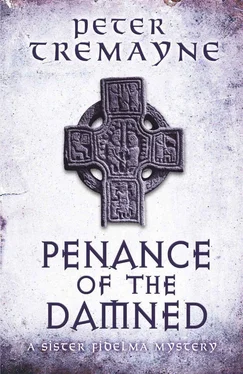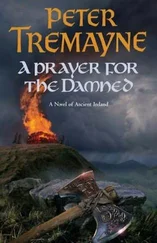Peter Tremayne - Penance of the Damned
Здесь есть возможность читать онлайн «Peter Tremayne - Penance of the Damned» весь текст электронной книги совершенно бесплатно (целиком полную версию без сокращений). В некоторых случаях можно слушать аудио, скачать через торрент в формате fb2 и присутствует краткое содержание. Год выпуска: 2016, Издательство: Headline, Жанр: Исторический детектив, на английском языке. Описание произведения, (предисловие) а так же отзывы посетителей доступны на портале библиотеки ЛибКат.
- Название:Penance of the Damned
- Автор:
- Издательство:Headline
- Жанр:
- Год:2016
- ISBN:нет данных
- Рейтинг книги:5 / 5. Голосов: 1
-
Избранное:Добавить в избранное
- Отзывы:
-
Ваша оценка:
- 100
- 1
- 2
- 3
- 4
- 5
Penance of the Damned: краткое содержание, описание и аннотация
Предлагаем к чтению аннотацию, описание, краткое содержание или предисловие (зависит от того, что написал сам автор книги «Penance of the Damned»). Если вы не нашли необходимую информацию о книге — напишите в комментариях, мы постараемся отыскать её.
Penance of the Damned — читать онлайн бесплатно полную книгу (весь текст) целиком
Ниже представлен текст книги, разбитый по страницам. Система сохранения места последней прочитанной страницы, позволяет с удобством читать онлайн бесплатно книгу «Penance of the Damned», без необходимости каждый раз заново искать на чём Вы остановились. Поставьте закладку, и сможете в любой момент перейти на страницу, на которой закончили чтение.
Интервал:
Закладка:
‘Is this what you meant by the Abbey of Nechta?’ Fidelma commented to Conri.
The warlord glanced at the wooden walls and closed central gate before saying, ‘It is, lady. The walls have been set up in recent months, at the order of Abbot Nannid. The community takes the name of Nechta as she was the mother of the Blessed Ita, who had brought the New Faith to this area a century ago.’
‘He ordered them to build the walls? I suppose Abbot Nannid has jurisdiction over the people of the Faith in this area?’
‘That he does, but he is not a person who endears himself to the local people – religious or otherwise.’
Without further comment, Conri led the way from the square up the broad sloping track in the direction of the fortress gates, which now stood wide open. Just before the gates, on the left-hand side of the track, loomed a tall pillar stone on which some writing in the ancient form of Ogham was inscribed. It was a simple text announcing the place to be ‘the king’s house’ – and Fidelma was again reminded of the Ui Fidgente’s long claim to the kingship of Muman. As in her previous visit, she was aware of the watchful sentinels on the walls, and she also noticed two warriors on guard at the gate. Conri’s red silk standard brought a respectful salute, and the warriors moved aside as they entered. Stable lads were already running forward to take their horses as they halted in the main courtyard.
Conri dismissed his men to the charge of Socht as two male servants approached to take the setan or saddlebags from Fidelma and Eadulf and, of course, the les , or medicine bag, that Eadulf had become accustomed to carrying with him everywhere he went.
‘Prince Donennach will officially greet you at the evening meal,’ Conri explained. ‘The fothrucad , the baths, will be prepared, and you must rest from your wearisome journey. These attendants will conduct you to your chambers. We shall all gather in the great hall when you hear the striking of four bells.’
Eadulf had learned by now that it was customary for people to bathe daily and generally in the evening. Cleansing was a ritual, and even for travellers arriving in such extreme circumstances, it was against all protocol not to go through the ritual before meeting the prince. There were baths for visitors in every guest-house of a palace, abbey or even a tavern.
Conri turned with a friendly smile to Enda. ‘I will show you to the laochtech , the house of the warriors, where we have our quarters. There you may also refresh yourself and rest.’
But Fidelma was still lingering. ‘It might be advisable for me to speak immediately with Gorman, before I go to my chamber,’ she said.
Conri glanced at her in disapproval. ‘Lady, even in these circumstances, the protocols must be observed and respected. Having arrived in the prince’s palace as his guest, you and Eadulf must first bathe and then meet with him to discuss matters. Afterwards, Gorman may have your full attention.’
Fidelma knew that to behave in any other fashion would have been a slight against the honour of the prince. When she expressed her acceptance of the situation, the warlord relaxed.
‘Excellent. Follow these attendants and they will show you the way to your quarters. Having been here before, I think you will find the surroundings familiar. I will be attending in the great hall when the bell rings for the feasting.’
As Fidelma and Eadulf followed the attendants into the main palace complex, Eadulf shivered slightly. It was not so long ago that they had been under this very roof, little realising that their host at the time was one of the conspirators who, had he known what they were about, could easily have had them killed. They walked across the same great hall, made more impressive on its inside than the outside walls. Huge tapestries covered the walls, and around the lower parts hung shields bearing the symbols of their owners who had once used them in battle. Swords of many varieties were displayed along with the shields; some were ornate and bejewelled, indicating the wealth of their owners.
At the end of the hall was the prince’s chair of office, an elaborately carved piece of oak with the icons of the Ui Fidgente inscribed on it. It was placed on a small raised platform overlooking a long oak table. Next to it, at a slightly lower level, was a smaller chair – presumably for the heir-apparent of the prince. The table was the very one where they had once dined under the watchful eye of the renegade steward, Cuana.
It was amusing to find they were being led to the same guest chamber that they had occupied at the time of their first visit. This was where the young attendant, Ciarnalt, had warned them of the steward’s treacherous nature.
The attendants laid down the visitors’ bags in the chamber and the elder of the two, a gentle-looking man with white hair and sharp blue eyes, bowed and announced, ‘I shall order water to be heated and the dabach filled for your pleasure. One of the females will attend you, lady, with soap, scents and linen towels.’
The dabach was a large tub or vat-like affair in which heated water was poured and into which bathers could climb. There, with the aid of sleic , or soap, they would cleanse themselves ready for the evening meal.
‘We have a separate facility for you, brother,’ the man added to Eadulf. ‘You will be called when all is ready. Is there anything else that you require in the meantime?’
There was nothing they could think of and so the attendants withdrew.
They had luxuriated in the hot baths, with spices and scents. Fidelma had half expected Ciarnat to appear as her attendant but another young girl helped her. It was when she had been at the fortress last and bathed in exactly the same bath-house that Fidelma had met Ciarnat for the first time. When she enquired after her, the attendant – a young, fair-haired girl – had explained her absence.
‘Ciarnat is not in this household today, lady. She has an elderly mother in the township and some days she goes to take care of her.’
Having bathed and rested, they found the summer sun was lowering and beginning to cast shadows across the courtyard and buildings; lanterns were being prepared for the coming darkness. Finally, a distant bell resounded four times and there came a discreet knock on their chamber door. It was the male attendant come to escort them to the great hall.
To their surprise, having arrived at the fortress with hardly a sign of anyone to greet them, the hall was athrong with many people. Fidelma noted that there were very few females present – apart from the attendants. The only immediately familiar face belonged to Conri, who came forward to greet them at once and explained that he would act, for that evening at least, as the prince’s rechtaire or steward. He then led Fidelma and Eadulf to the dais on which the prince’s chair of office was located.
Prince Donennach rose from his seat and took a step down to the same level to greet Fidelma in recognition of her rank. He was a tall, broad-shouldered young man in his mid-twenties, standing with legs spread slightly apart in the manner of a warrior. His grip was firm, an indication of the power of the muscles behind it. His features were not exactly handsome, but pleasant, and his light grey eyes seemed to regard everyone with amusement. The prince’s hair was fair with a dusting of red in it as, indeed, was the long moustache that dangled either side of his mouth – the only facial hair on an otherwise cleanshaven face.
‘You are welcome, lady. Or should I call you Sister Fidelma?’ He greeted her with a genuine smile of recognition.
Fidelma returned his greeting with a bow of her head. ‘I have left the religious, Prince Donennach, and now serve only as adviser in law to my brother.’
Читать дальшеИнтервал:
Закладка:
Похожие книги на «Penance of the Damned»
Представляем Вашему вниманию похожие книги на «Penance of the Damned» списком для выбора. Мы отобрали схожую по названию и смыслу литературу в надежде предоставить читателям больше вариантов отыскать новые, интересные, ещё непрочитанные произведения.
Обсуждение, отзывы о книге «Penance of the Damned» и просто собственные мнения читателей. Оставьте ваши комментарии, напишите, что Вы думаете о произведении, его смысле или главных героях. Укажите что конкретно понравилось, а что нет, и почему Вы так считаете.












